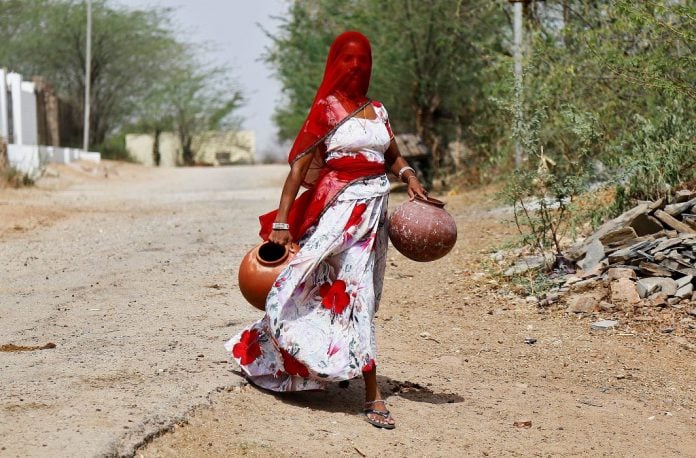
A report by NITI Aayog has been scathing about Rajasthan’s drinking water supply and has said that only 44 percent of its rural habitations are fully covered by this supply. It has asked the state to improve the access rate and quality of drinking water in rural habitations while lauding its efforts at surface water restoration and participatory irrigation. It further adds that there was no improvement in water quality in terms of contamination by arsenic and fluoride. Following these remarks, the Ashok Gehlot government has prepared a Conservation, Protection and Regulation of Water Bill.
Rajasthan’s climate varies from arid to extreme arid. The area west of the Aravalis receives low and erratic rainfall less than 300 mm. Successive droughts and scanty rainfall have ensured that groundwater resources are meagre. This, along with population explosion and increase in per capita consumption of water, has created tremendous pressure on water resources. To top it, the state has not been able to formulate laws that can prevent over-exploitation of groundwater. A draft groundwater legislation has been in circulation since 1997, but the state has not been able to muster the courage to enact it as the perception is that this could spell political disaster.
Recent initiatives of NGOs have pushed the state towards building a consensus and awareness among people before introducing the Bill. The earlier draft Bill failed to address the issue of equity. Equity is a major concern in groundwater use as it is accessible to large and medium farmers while depriving small and marginal farmers. This is due to a lack of clarity on the use of rights of groundwater. Groundwater use rights are given to landowners as per the Easement Act, 1882.
At the same time, groundwater is termed a common pool resource in policy discourse. The absence of clear rights assumes serious proportions in the case of groundwater. Legally, landowners do not have any rights to underground resources, including water. This has led to unfair distribution of water across farms, often depriving marginal and small farmers who can’t invest as much as their counterparts on water extraction. Over-exploitation by a few farmers then aggravates the inequalities and leads to the resource degradation becom-ing irreversible in most parts of the state. The solution is to treat water resources, surface as well as groundwater, as a common resource, said DS Singhvi, a former irrigation engineer and an expert on riparian rights.
“The most pressing issue is access to water to all sections of the community. For instance, groundwater overexploitation by one may affect water levels in nearby wells. Similarly, development of a recharge structure by an individual may result in groundwater recharge in the neighbour’s well. Water rights should be delinked from land rights, with clearly defined property rights on water.
This requires an appropriate legal framework and effective institutional arrangements. Though this dimension is often brushed away at the policy level by terming it a difficult task, there is a need to make a beginning in this direction. The main water concern of Rajasthan is dealing with severe scarcity,” said VN Reddy, a water expert based in Hyderabad.
According to the chief engineer of the State Water Resources Development Project, Amarjit Singh, the state government will bring in the Conservation, Protection and Regulation of Water Bill to prevent misuse of both surface and groundwater. The proposed Bill will make citizens liable for punitive action for misuse. The Bill proposes penalties and even imprisonment of up to a year for misuse of water from dams, canals or drinking water pipelines. It will also have a provision for punitive action against officials of the public health, engineering and irrigation departments who fail in their duties to prevent loss, pilferage or theft of water.
Currently, there are four Acts: Water Resources Regulation Act, 2012; Irrigation & Drainage Act, 1954; Farmers’ Participation in Management of Irrigation Act, 2000; and Flood Plan Zone Act, 1990. These Acts will be incorporated in the new water conservation and protection Bill, said Singh. Once enacted, Rajasthan will be the first state to have a law to ensure minimum water supply to every household. According to the draft Bill, every person has the fundamental right to be provided basic water for leading a healthy and dignified life, and the quantity of basic water shall in no case be less than 70 litres per capita per day of groundwater and/or surface water. The proposed law also provides for a comprehensive grievance redressal mechanism.
Under the new system, the municipal water committee shall be responsible for ensuring that every household’s wastewater is treated and recycled where possible before the final disposal. In villages, the panchayat water committee will have the same responsibility.
The draft Bill suggests that conservation, protection and regulation of surface water and groundwater shall be undertaken in an integrated manner. “Water shall be protected from such impacts that affect the equity of access and sustainability of the resource,” the
draft says.
The proposed law calls for a water security plan for conservation and augmentation measures, socially equitable use and regulation of water. The state government shall ensure that the availability of water for different uses does not adversely affect the aquatic ecosystems that depend on the same water resources, the draft Bill says. It also talks about mapping and management of aquifers in the state.
Rajendra Singh, a water conservationist, welcomed the proposed Bill and suggested stricter provisions for misuse or wasting of water. He said that penalties for wasting and polluting water were a revolutionary step in the interest of the state. BJP state president and legislator, Satish Poonia claimed that the BJP government under Vasundhara Raje had initiated a Bill, but could not introduce it in the assembly. However, Poonia said that rather than imposing penalties, the community should be educated on the judicious use of water.

